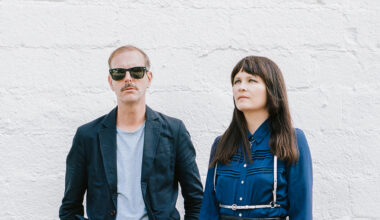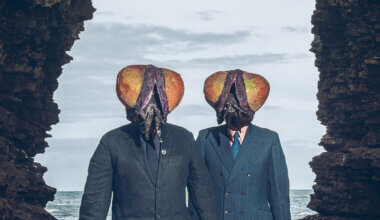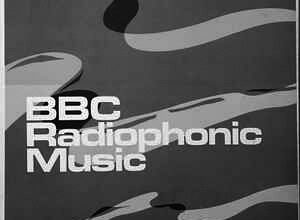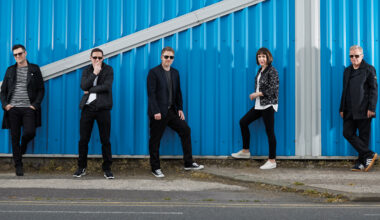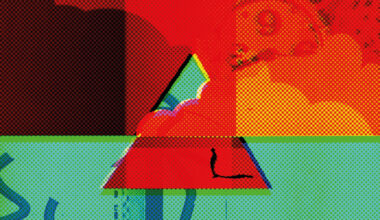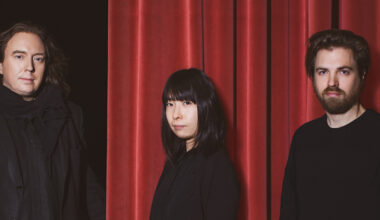He was forced to the join the Hitler Youth and jailed by the East German secret police. He became a musician after hanging out with Hendrix and Beefheart at a nudist camp in Corsica. As a member of Kluster, Cluster and Harmonia, as well as a hugely respected solo artist, he was a pioneer of the krautrock revolution. Meet Hans-Joachim Roedelius, a man whose life has been no less than extraordinary
We’re fortunate to catch Hans-Joachim Roedelius at his Austrian home shortly before his 80th birthday. Only 24 hours previously he’d been playing in Brazil and in a couple of days he’s headlining the Supermassive Festival in Helsinki. Billed as “a ride through the underground” and a showcase for some of the most exciting up-and-coming experimentalists from across the globe, Supermassive boasts a line-up of hot young hipsters such as Shabazz Palaces, Cold Cave and Finland’s own K-X-P. The irony is not lost on the soon-to-be octogenarian maestro.
“Sounds crazy I know, but I’m really excited about it!” declares Roedelius.
Make no mistake, this is a man who never stops. And to his utter delight, nor does the demand for his beguiling, distinctive, peerless music. His recorded output seems almost too astonishing for words. We tell him that we’ve heard he has around 1,600 musical works to his name.
“Oh, there are more! And then there’s also my poetry and my photography…”
Roedelius’ continued passion and excitement for making music is a wonder to behold – and that’s perhaps never been more true than now, an incredible 45 years into a career which he asserts was simply the result of “a wonderful accident”.
Certainly, it was never planned. A trained physiotherapist by the end of the 1960s, a lifetime of mending bodies lay before him. But whether by accident or design, or possibly a combination of both, another path opened up for him. It eventually enabled him to use his healing hands in a different way, although not before he’d had one or two convoluted and seemingly improbable adventures. More on those shortly.
We’re speaking with Roedelius primarily because of the release of two albums, ‘Tape Archive 1973-1978’ and ‘Kollektion 02: Roedelius’, the latter a concise showcase of his music compiled by long-time admirer Lloyd Cole. The albums have been issued simultaneously by the Bureau B label to coincide with his birthday and to acknowledge his incredible body of work.
Roedelius’ birthday celebrations will no doubt be emotional. He’ll be spending the day with his 40-strong extended family in Dresden and in the evening he will read extracts from his autobiography to an audience of admirers. By this time, he’ll have been honoured with the Grand Decoration for Services to the State of Lower Austria – which is something like the British MBE – in recognition of his tirelessly creative contribution to his adoptive country’s cultural wealth. And probably not before time.
The one-time East German city of Dresden is a place that must stir mixed emotions in the great man, though. It’s where his roots are strongest, his family having settled here after fleeing from the horrors of Berlin during World War Two (but not before the 11-year-old Hans-Joachim had been forcibly enrolled into the Hitler Youth). Yet Dresden is also where he spent two years incarcerated by the Stasi, the communist secret police, after going AWOL from the East German army in the late 1950s (following, once again, involuntary conscription). Accused by the Stasi of being a spy for the West as well as a deserter, he endured forced labour down the coal mines and was regularly woken in the small hours for lengthy interrogation sessions.
With typically self-effacing nonchalance, he brushes off this dark chapter as a kind of character-building experience.
“Oh, it was not too bad,” he says. “I was young and I could bear it.”
But maybe he’s right. Maybe his experiences at the hands of the Stasi – as well as those that came before them – gave him an impetus to escape the stultifying confines of oppressive and paranoid East Germany and to truly pursue life.
Roedelius eventually managed to cross back into West Germany and headed for his original home city of Berlin, pulled in by the magnetic force of change that was crystallising there and gravitating towards the burgeoning underground arts scene. His qualification as a physio enabled him to quickly train as a masseur, which in turn led to him meeting all manner of interesting folk, who offered him a variety of odd and curious jobs here and there. People liked him and trusted him and wanted him around.
One such person was the owner of a Berlin knitwear manufacturing company, who welcomed Roedelius into his life, asking him to first become his personal masseur, and then to fulfill the more involving roles of family butler (bear with us here), childcare supervisor and – because his boss rather too regularly enjoyed over-indulging his prodigious appetite for das bier – family driver. Which is where everything starts to come together.
In the summer of 1967, Roedelius drove his employer’s family to Corsica for a holiday at a naturist camp (these are Germans, remember) and was captivated by the beauty and freedom of the island. He promised himself he’d return the following year. By this time, he’d co-founded a group of radical art experimentalists collectively known as Human Being – a kind of Berlin equivalent to Andy Warhol’s New York Factory – which soon morphed into the fabled Zodiak Free Arts Lab. Its members included controversial performance artist Joseph Beuys, as well as musicians Conrad Schnitzler and Dieter Moebius.
It was his second season on Corsica that made Roedelius realise that he was destined to follow a musical path. Along with his fellow Human Beings, he gave the naturist camp’s beach bar the feel of a Mediterranean Happening, enjoying what he considers his first performances as a bona fide musician during the many all-night drumming, improv and vinyl-spinning sessions that attracted party people from way beyond Corsica’s sea-bound limits. Even Jimi Hendrix and Captain Beefheart showed up to immerse themselves in the sun-drenched, free-loving vibes.
When the summer season ended, Roedelius and his pals returned to Germany via mainland France, spending time in first Avignon and then Paris (where Roedelius spent some time as a private masseur to the wife of a bohemian aristo) and feeling the climate of revolution that was sweeping the country. By the time they landed back in Berlin, Roedelius was fired with a zeal to make new music and heave further on those already shifting paradigms. It was at this point that Roedelius formed Kluster (later anglicised to Cluster) with Conrad Schnitzler and Dieter Moebius.
“Conrad and Dieter already knew each other and we were all very like-minded,” says Roedelius. “Conrad was such a great friend and he was so full of energy. He was the main force behind the Zodiak Free Arts Lab. He found the place itself and it was Conrad who negotiated with the city authorities to secure state funding.”
Roedelius and Schnitzler were indeed extremely close; true brothers and soul mates. Such was their bond that Schnitzler even invited Roedelius to live with his family – his wife and three kids – when money was tight for them all, but when there was also an incredible creative energy between them.
“We just felt so free. OK, we had no money and we had to work very hard to survive, but it was all part of what we were doing. There was this spirit in Berlin in the 1960s – we trusted our instincts and knew we were being guided by something. But it wasn’t political for me. I’d seen the results of politics in Berlin in the 1940s, and then in East Germany in the 1950s. Going through the war was horrible and so was being jailed by the Stasi. So, yes, it was this beautiful sense of freedom that was important for me.”
Kluster/Cluster recorded four studio albums between 1969 and 1972, with Conrad Schnitzler leaving the group after the second of these. From the very beginning, they worked with production legend Conny Plank, who engineered their debut album, ‘Klopfzeichen’, and with whom Roedelius and Moebius went on to enjoy a very long and productive relationship. Yet despite the many studio sessions, the larger part of those years was spent criss-crossing Europe on their tour bus. Roedelius encapsulates his abiding memories of that time succinctly and positively.
“It was such a great experience,” he says. “So many people and everybody was so interesting and different! I’m thankful that I’ve been able to live the life I have and to have been able to work with all these wonderful characters.”

And then came Forst, the rural retreat and commune that is central to the Roedelius story. He first heard about Forst at a time when he and Moebius were starting to feel the strain of long stretches out on the road and were ready for a new impetus following the closure of the Zodiak Free Arts Lab by the Berlin authorities due to concerns over its problematic political associations (members of the Baader Meinhof Group were said to have been tenuously connected) and its increasingly open flouting of the city’s drug laws.
“A friend of mine who was an antiquities dealer and very well-travelled told us he had found this big place by the river Weser in Lower Saxony,” remembers Roedelius. “He said it was going really cheap. But when we went to look at it, there was nothing there. It was just a lot of old derelict buildings.”
Roedelius and Moebius couldn’t resist the lure of the rural alternative with its promise of a different way of life, though, and Cluster and their entourage moved from Berlin to Forst in 1973. They lived collectively, getting stuck into the challenge of renovating the farm and its outbuildings, and constructing their own recording studio and rehearsal space.
The years between 1973 and 1978 proved to be a golden era for Roedelius and this is the period covered by the ‘Tape Archive’ album. His output during this five-year span seems remarkable now. There were two solo albums and four Cluster long-players, including the classic ‘Zuckerzeit’, a record produced by Neu! man Michael Rother, who also became part of the Forst commune. Roedelius, Moebius and Rother recorded two albums as Harmonia too, while Brian Eno’s trip to Forst in 1977, when he took a brief break from his intensive work with David Bowie on ‘Low’ and ‘Heroes’ in Berlin, resulted in the collaborative piece ‘Cluster & Eno’. Many of these records appeared on Brain Records, arguably the most significant German krautrock label.
“It was a productive time and I don’t think all that would have happened if we’d stayed in the city,” notes Roedelius. “But we were also lucky to have the support of Brain Records. Gunter Korber and Bruno Wendel [who ran the imprint] were passionate about our music and worked really hard for us.”
For his solo adventures, Roedelius had a private workspace in which he housed a Farfisa organ, a Revox-A77 tape machine and an echo device. He borrowed synthesisers from the Cluster studio next door as and when he needed them. When time allowed, he would put extra hours in, instinctively exploring the soundscapes he had the urge to create just for himself, separate from his recordings with Moebius and Rother. He’d keep the tape running and simply let the music happen.
“It was one of the most beautiful periods of my life and also my family’s life,” he says. “Our first daughter was born there, in the commune and not in hospital, which was totally unheard of in Germany at that time. It was so good to have the freedom for us to work together as artists, experimenting with our music during the night, but doing physical work during the day too. We chopped wood and we made bread and things like that. Paradise!”
Looking back now, what would be his personal favourite album from that time?
“That’s a tough one,” he replies after a short pause. “There was so much. But if I have to choose, it would probably be the ‘Selbstportrait’ series [the first three volumes of which came out in 1979-1980]. I think they were the most innocent and the records that best defined that time.”
Talking about his various releases, Roedelius is full of praise for Tangerine Dream’s Peter Baumann (who co-produced Cluster’s 1979 album ‘Grosser Wasser’) and American Tim Story (with whom he has produced four albums under the name Lunz), as well as Brian Eno, of course. But he attributes much of his success to the production talents of Conny Plank, who remained integral to the Roedelius/Moebius/Cluster story both as a producer/engineer and as a musician right up to his death in 1987.
“Conny made an important difference, he made everything special,” says Roedelius. “There would be no overdubbing with him. He would just let us play without interfering. He was one of the best.”
Though essentially an extemporiser, Hans-Joachim Roedelius’ musical voice is truly singular and is pehaps more akin to that of a classical composer. Experimental and improvisatory, yes, but also highly accessible; warm and pastoral and, with reference to its understated and minimal simplicity, soothing too. Lloyd Cole paid eloquent compliment to Roedelius when he was asked about the ‘Kollektion 02: Roedelius’ album he has compiled for Bureau B.
“Cluster led me to Harmonia and then to Roedelius’ solo works, which led me to believe that the soul I was finding in Cluster, which seemed so absent from their peers, came primarily from him,” said Cole. “The melodic sensibility which drew me in is his, for sure. Roedelius’ voice is unique, instantly recognisable, and it still resonates.”
The word “soul” pretty much nails it. It’s there in every moment of Roedelius’ music, which developed further after a sudden exit from Forst precipitated a period of retreat and reflection. With rumours of radiation leaks from an upriver nuclear power station and reports of increased instances of childhood leukaemia in Lower Saxony, he decided to abandon the bucolic idyll in 1978. But he did so with a heavy heart.
“Yes, it was a big shame to leave,” says Roedelius. “But you know, after many years of exploring with electronic sound, I realised I’d got bored with it. I’ll tell you something else too. It kind of made me ill. I’d done so much experimentation on my Korg MS-20 that I’d found out how bad music can sometimes sound. There was something about the vibrations in the depths of my sonic experiments that got inside me – and not in a good way. So I sold my Korg and took up the piano.”
He’d actually learnt the basics of the piano as a child, just after the war, although he was never taught extensively as his family could only afford to pay for a handful of lessons. But then a visit to Vienna for a recital in around 1980 provided a small epiphany.
“I felt like I’d had my first true encounter with the beautiful sound of the piano,” he explains. “It was the medicine I needed to cure the Korg disease!”
Five years later, he gave his first full piano concert on a Steinway at London’s Bloomsbury Theatre. The many wonderfully meditative, organic compositions he has recorded since then have often been described as having strangely restorative effects on people.
“So after stopping my career as a physiotherapist, when I would have helped to heal people with my hands, I was again perhaps doing some healing with my hands, but this time through my playing.”
That tone of modesty and humility runs throughout much of our conversation today, as Roedelius surveys his long career with sanguine objectivity and warmth. With so much to look back on (and look forward to – a second volume of ‘Tape Archive’ pieces has already been discussed), he seems extraordinarily contented with the rich life he’s led and is delighted to have been able to pursue his interests in the way that he has. And much of his success he puts down to his ever-present wife, Christine Martha.
“Nothing would have happened without her,” he declares with a broad smile. “She’s my muse and my advisor. She made everything feel so easy for me, always being at my side and also looking after our family. I’m just so happy to be who I am and to have worked with all these wonderful people. So much seems to have just happened! It’s such a privilege to be able to do what you want to do, when you want to do it. Such a gift.”
‘Tape Archive 1973-1978’ and ‘Kollektion 02: Roedelius’are both out on Bureau B

